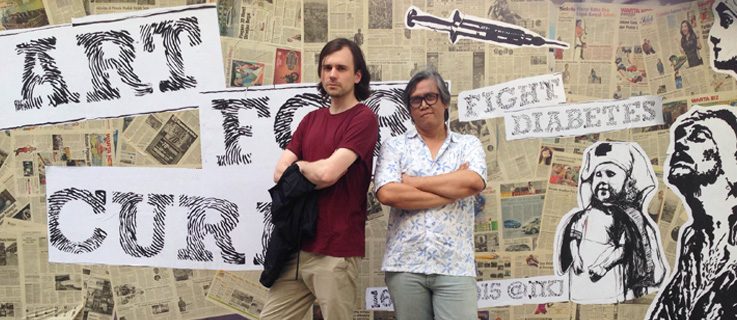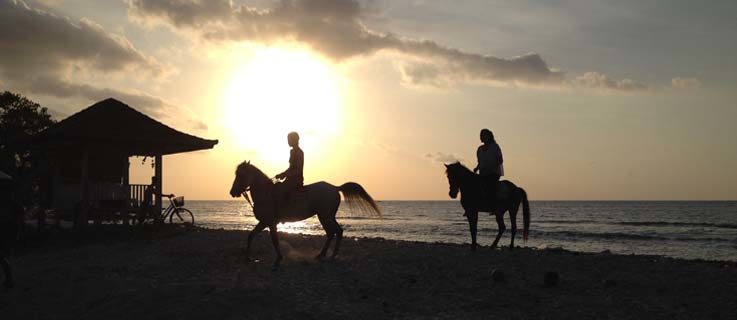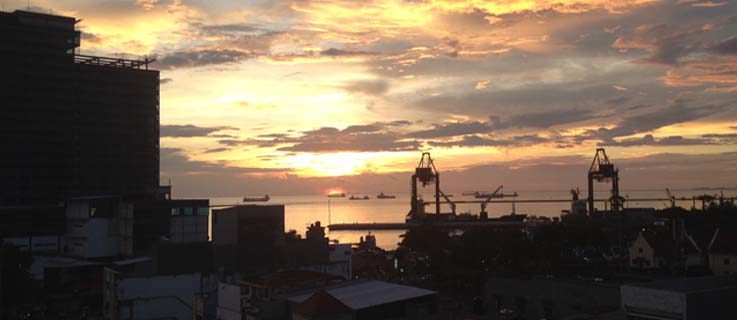Literature | Essay
Back to the Future in Indonesia, May/June 2015
I begin my diary at the airport in Istanbul at The Greenport, an open plan bar that sells Efes beer and tea amongst various duty-free boutiques and perfume shops. I have to wait two hours for my connecting flight to Jakarta. An employee at the counter of the Turkish Airlines had to complete my boarding card by hand due to a system error. I am not particularly worried about that. This is the general stoic stance that I adopted when I asked myself how someone like myself, who finds an early summer stroll in the Schlesischen Tor area of Berlin unbearably warm, should stand it in the tropics. Don’t worry too much, I thought to myself, let things happen and believe in the good. I order salted nuts and a water. The radio plays an instrumental version of Celine Dion’s “My heart will go on”.
Thirteen hours later I am spontaneously enthusiastic about Jakarta’s heat. The airport staff wear loose-fitting pastel uniforms, and their smiles are actually contagious. I move slowly. It has been dark for some time. The Goethe Institute driver explains that night falls in Indonesia every evening at exactly 6 p.m., 365 days a year. The rainy season has just ended. On the city motorway I’m reminded of Chicago, which may be because of the high-rise buildings and the giant billboards, on one of which I read the words Bratwurst Sausage. If I had ever previously been in another Asian country, I probably would have been thinking of these countries instead of the USA. Probably too many people think too often about the USA. The Goethe Institute car is stuck awhile in a traffic jam of course. So now I am part of the multi-lane avalanche of cars that I know from my image searches. Very young motorbike riders, colorful striped polo shirts, white face mask.
The idea is that the same things interest me now in Jakarta that would interest me in a European or US American metropolis. On the phone to the head of the Goethe Institute I somewhat inelegantly named the catchwords fashion, art students and electronic music. I confess that I’m now interested in the passions of people younger than I am. At my age most people retreat into partnerships and families because they promise more stability than the eclectic communities of the twenties. With this in mind, the Goethe Institute has flown me to a better country – it’s said that half of all Indonesians are younger than 30.
On Saturday night I was taken clubbing. My local guides – two young women from Jakarta – tell me that something is missing in the nightlife of their city ever since the legendary nightspot The Stadium was closed. A year ago a policeman died from an overdose at the 24-hour club they tell me, which sounds like a rather moderate punch line to me. We go to the Colosseum in Chinatown. It has an immense light show, with visuals on giant screens and rhythmically illuminating cords hanging down from the high ceiling. The music does not build up and intensify, it just remains at a crescendo the whole time, strident, a bit hysterical, and in the late hours painted dancers perform. A club like a Disney amusement park ride. I walk around with an expensive Bintang beer in my hand and have a good time. People lean on bar tables equipped with drink buckets and shishas as soon as one pays for them. Many look at their phones. Group photos with flash, table service, vodka energy in the Far East. My guides tell me that it is typical of Jakarta that people don’t dance much.
Although in the last two years I have been in a rather lean phase, on the sidewalks of Menteng I feel peculiarly massive and fleshy. When a second pale German appears next to me, this feeling intensifies. Two potatoes are walking in Jakarta, and the one says: “It’s never a good sign in a bar when there are no Indonesians.” Some of the street food vendors shout German phrases from a distance. “Wie geht’s? Ich liebe dich!” (How’s it going? I love you!) In front of a crowded restaurant two children in dirty animal fable costumes with huge yellow foam heads dance to a local hit song. The song is incredibly happy.
As one’s income increases, the time one spends in the open air in Jakarta decreases. For the equivalent of three euros you can spend 50 minutes in an air-conditioned taxi riding through the city listening to the hits of Ellie Goulding on the radio. Also, new shopping malls plastered with Cara Delevigne banners are constantly opening, and their indoor temperatures remain under 20°C. As a tourist, these malls give me a homey feeling. Even the locals like to frequent them.
In the villa of the former Indonesian president Habibie I meet towering German men in batik shirts. They have all lived in Indonesia for quite some time and tell me that many negative changes are currently taking place, that the warmth and kindness of Indonesians is giving way to uncertainty, the smile is disappearing, the country is becoming alien to itself. This has to do on the one hand with the radicalizing economic liberalism and on the other with the growing strength of fundamental religious conservatism. I wonder whether it would be useful to scan the entire globe for this diagnosis, and where it does not apply you would have the best of all possible countries. Despite their criticism, the tall German men exude a veritable glow of love for Indonesia. There must be periods in their biographies in which they have esteemed this country above all others. Some of them are Christian Germans married to Muslim Indonesian women; such marriages are now prohibited by law. A lawyer from Franconia says that there will soon be a ban on alcohol. But he doesn’t abandon hope: “You will be able to bypass the law. This is one of the strengths of this fantastic country. You somehow muddle through.”
Situated in the mountains, Bandung is significantly cooler than Jakarta. Formerly a good deal of partying went on here, but now there are strict curfews. The open-hearted and amiable head of the local Goethe Institute also talks about the change in Indonesia. He has loved the country a long time, traveled from one end to the other and always felt comfortable and safe, but some things he hardly recognizes any more. We drink a couple of Bintang beers in a bar where a pool tournament is in progress. I spontaneously take part and lose to a California expat again. When I go to bed I feel feverish, the funny thing is that it is accompanied by an unexpectedly high level of comfort. I hear the air conditioning quietly humming, and the prospect of sleeping the next eight hours is rather intoxicating.
The largest Muslim democracy. This is one of those pieces of information you get when you ask educated German citizens about Indonesia. And this is one of the reasons why I didn’t pack many shorts but instead long-sleeved shirts. I learn in Indonesia that religion must be entered in every Indonesian passport. Muslim, Hindu, Catholic, Protestant or Buddhist are the options. I think that in the best of all countries religious affiliation would also have to be in the passport, let’s say as soon as you are 23. But everyone would have the option of devising their own religion, and you could change your religious orientation exactly once a year. This would result in new, innovative religions as well as the return of old religions. For example, at the age of 31 you could renounce the religion you invented at 23 and then return to it at 66.
The whole country raves about Yogyakarta, aka Yogya, my third stop on the journey. This is where the artists live, where there are the most universities, and of course nature is spectacular, too. A young woman who gives German courses for DAAD prepared a dense program for me. I meet people in theater, young publishers and journalists. It is exhausting and very entertaining. The German teacher is an optimistic person while I am a rather pessimistic person. This engenders humor – we understand each other quite well. On most days we have a driver who has a very long and well cared for fingernail on the small finger of his left hand to show that he does not do physical work. Just after returning to downtown Yogya after a visit to the Borobudur Buddhist temple, I see a somewhat ragged transvestite hobbling over a city bridge. The German teacher explains that strikingly dressed homosexuals have a better chance of collecting alms because it is then obvious to others that the person is seen as being punished by God. Later a journalist for investigative research, who allegedly has often risked his life and wears a black T-shirt of the band The Kiss, adds that homosexual Indonesians increasingly undergo operations. He said that in Yogya there is a moderate Muslim institution that advises transsexuals how they should conduct themselves in their new sexual roles in accordance with Islam.
What I also learned in Yogya: the polite, quiet Javanese are often annoyed by the loud directness of people from other islands, while they in turn consider the Javanese sly and shifty. At McDonalds, besides its world-famous products, rice in burger paper as well as a much sweeter Fanta are sold, and while many Indonesians believe in ghosts nobody is afraid of bats or geckos. When I jump up from the table because of bat, everyone laughs at me.
In the framework of the International Writers Festival on the island of Sulawesi, I meet the writer Andreas Stichmann. We are accommodated in the same hotel tower, whose lobby coldness Stichmann aptly describes as sweet and cheap. On the first evening, we go hungry and lonely through the harbor city. Holes in the ground lead directly down into the sewer system, and no one speaks English, which is certainly why we pay the taxi driver five times more than the locals do. Once we take a bicycle rickshaw to a restaurant for smoked fish, where we observe how an annoyed waiter in passing hits a flying cockroach. The cockroach is still alive after the blow and we switch to a local eatery offering club sandwiches and French fries. The young people in Makassar constantly want to take photos with us. “Hey, Mister!” they call, and come running with smartphones and tablets. An adult woman at the seaside says “You have nice skin”, and then nods lost in thought. I find her darker skin no less nice, but I don’t know whether she would believe me, since I always seem curt when I say something. At the open-air concerts on the festival evenings, there is no alcohol and yet the mood is great. The people of Makassar are a good audience. Teenage girls spontaneously start ring dances, causing their colorful headscarves to flutter. One of the young festival workers, who call themselves local organizers, asks me whether Germany also has beautiful islands. I nod and say: “Yes, there are some islands. The nicest island is the island of Hessen.”
We international guests – authors from Singapore, Malta, Australia, 18 German-speaking journalists as well as Andreas Stichmann and I – have an outing to the tiny island of Leila on the last day of the festival. We go with motorized fishing boats. I make a video, swing my smartphone from the blue sky down to the palm trees of the approaching shore, and send it as an iMessage to a friend of mine in Berlin. She answers two minutes later. It seems seriously futuristic that we can send videos and texts between South East Asia and Berlin within seconds even though I am sitting in a small wooden boat on the ocean. For a moment I have the relaxing feeling of affirming the Web present. The permanent contact, the showing-off, the nervous dawning. The longing for meaning beyond the visible will increase, and one could push into this market as soon as one has overcome sentimentality. OK, I think, let’s do it! And then I glance silently at the faces of the journalists around me. Sweat glistens on their foreheads.
In a small hut amongst palm trees we eat a typical regional lunch: fried fish, rice, incredibly spicy sauce, roasted bananas. I immediately eat a banana in the hope that the hot red sauce can be somewhat neutralized. One of the charming local organizers has a good laugh at my expense. He is a cool young man about 20 in an enviously chic batik shirt. After eating we stand under a blue sun sail stretched between two palm trees and he praises my glasses: “Your glasses are really cool, Leif Randt!” I want to say something about my glasses when a bang interrupts our conversation. The sun sail buckles downward and presses onto our heads. The local organizer looks at me wide-eyed: “Coconut!!!! Oh my god, Mister Leif Randt! Are you OK?!” We go a step to the side. It takes a moment to realize that we were almost killed. We sit again in the hut. “Here you are safe, Mister Leif Randt.” A devoutly religious girl who speaks perfect English relates the legend of spirits who lived in the coconuts and knew exactly who they hit and who not. A German journalist recalls that falling coconuts are a frequent cause of death in the southern hemisphere. “The skull of the early renowned author Leif Randt, that rarely smiling, often misunderstood author of artificial German novels, had his head caved in by a falling coconut on the tiny island of Leila off the coast of Sulawesi.”
A few hours later I ride on the back of a motorbike and hold on firmly to my local organizer. Together with four friends, all of whom are exactly ten years younger than I am, we stay up all night watching the Champions League final between FC Barcelona and Juventus Turin. We watch the match on a screen in front of a 24-hour supermarket. The place is full of young men (exclusively), most of them arriving on motorbikes. Nobody drinks alcohol, but there is still loud cheering for each offensive action, for both teams alike, and for the four goals there is no holding back. After the match many rev their engines and burst into FC Barcelona fan songs. It is obvious that they would also have sung Juventus Turin fan songs. More important than the drama seems to be the enjoyment itself. The post-match reports are not shown. Soon the young men hop on their machines and clatter away. The call to morning prayer can be heard from several mosques. It’s five in the morning. The sun will rise in exactly one hour.



